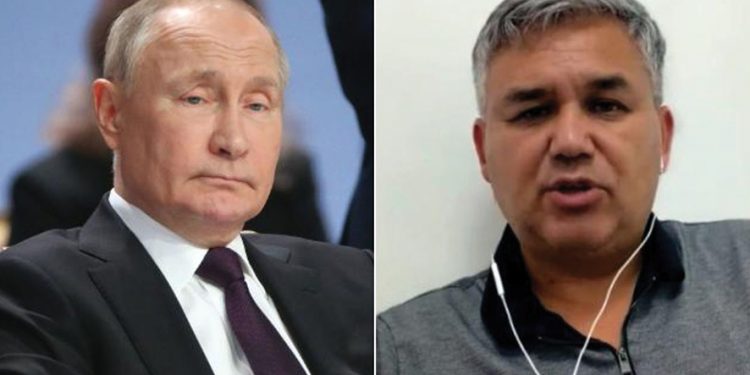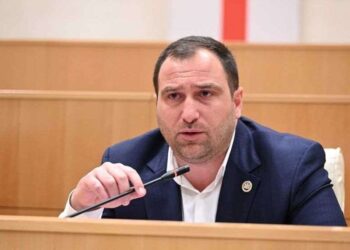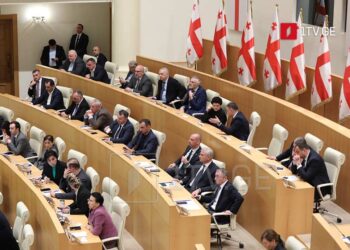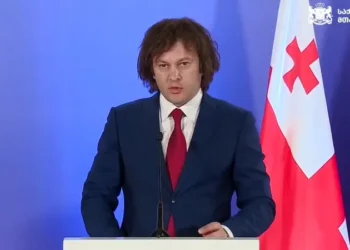Political consultant Abbas Gallyamov was one of Russian President Vladimir Putin’s speechwriters from 2008-2010. In an interview with RFE/RL’s Georgian Service, he talks about the back-and-forth with the Russian leader over drafting a text, and his perhaps surprising pick for Putin’s successor. Last week, the Russian Interior Ministry added to its wanted list the self-exiled former speechwriter, who is known for his analyses of political and social developments in Russia and the Kremlin’s ongoing invasion of Ukraine.
“I never communicated with Putin directly,” Gallyamov tells us of his time serving under Valdimer Putin. “I was not the top speechwriter; only the top one has the right to speak to the President personally. I was high-ranking, though, present during meetings, both public and private, behind closed doors. My general impression was that he was a very good manager. Very rational, very logical; you really couldn’t imagine him at that time doing what he’s doing now. He knew how to ask questions, he was careful not to press on people when listening to their answers – because when you’re a big boss, and you express your own opinion, then all the other people try to support your opinion instead of expressing theirs, so he was careful to avoid this.
“When the war started, I wondered how this man whom I knew many years ago had turned into what he is now. Back then, I saw him working on subjects which were very important but still not of crucial importance, they were not something on which his political life depended, not existential threats, so to say, not something like relations with NATO, or relations with the Russian opposition, who is trying to overthrow him. Back then, he was not dealing with personal attacks against him. And at that time he could afford to be rational. But now that it has come to something that he could be blamed for, or him doing something wrong, he has quickly turned into somebody irrational and very emotional. Displaying strength is his fetish, he cannot imagine himself looking weak.”
In your time as one of his speechwriters, we had the Putin post-Munich speech, post Bucharest summit and post the war in Georgia. And he was a different man back then, you say?
At that time, the dominating agenda was the agenda of modernizing Russia; the moralization of Russia. It was Medvedev who was imposing this at that time, trying to update Russia, to make it more modern. He was trying to improve relations with the Western world. And the Obama – Medvedev relations were good. Putin was dealing only with the economy. Of course, he was influencing policy, but it was behind closed doors; it was not a thing I could see. I was present only at the meetings that were official but with no journalists allowed. Still, these were official meetings, with official protocols, minutes and so, and he didn’t discuss politics much there. A couple of times, I made speeches for when he was speaking at the conferences of the ruling party. He was giving political appraisals, political estimations, but still, he was careful not to intervene, publicly, into the sphere of responsibility of the president.
Did he give you pointers as to what he wanted to speak about?
There were very rare cases when he took care of the text beforehand, actually – just two, three, maybe four texts a year. The majority of texts, he didn’t check before; we just wrote them with the administration in general, with ministers, deputies who are responsible for these fields. We’d prepare the speech, give it to him, and he would look at it in the car, on the way to the event, maybe half an hour beforehand. Sometimes, even when he was entering or about to begin speaking. He speaks very easily, it wasn’t a problem for him: he starts reading the text, and then he sees that he wants to add something, so he lifts his eyes, and he speaks to you all on his own, then he goes back to the text. So he didn’t need to take great care of our texts beforehand. It was very rare for him to check the draft and then give it back to you. Only the main speeches were like this.
Which speeches did you get to write? Who was writing the speeches on foreign policy?
One can’t claim any speech given by the President as “yours”. It’s always a collective work. You write it, several other people look at it, add some ideas. It’s always a collective work, never the personal work of one person.
At the April 2008 Bucharest NATO Summit, Putin talked about Kosovo, Ukraine and Georgia’s NATO operations. It was there that he first claimed that Ukraine wasn’t a country per se. Any idea who worked on that speech?
At that time, his chief speechwriter was the same as now – Dmitry Kalimulin. So since it was on foreign policy, it would be a combination of speech writers, Kalimulin and the foreign policy directorate at the Administration of the President. Sometimes, very seldomly, in very rare cases, Lavrov himself would take part in the writing. Now, currently, at the foreign policy directorate they have Ushakov, who is a presidential aide on foreign policy.
Why did you return to Putin’s team as a speechwriter, back in 2008?
I knew I would get a promotion, that I would work in a much higher position than during the previous time I was there, that I’d be writing speeches for Putin. I knew that, in general, the country was changing. It was like some bright future was in front of us. Nobody could predict at that moment that Russia would turn into the kind of fascist state that it is now.
When did the breaking point come, when you told yourself – I don’t want to do this anymore?
The real breaking point was in 2014, when I left civil service, and decided I would never go back to working for the state. 2014, right after Crimea. The second breaking point was 2018, when I decided I had a conflict with the Kremlin – I was already working as an independent political consultant, but I still had a relatively normal relationship with the Presidential Administration. But in 2018, the situation started changing from bad to worse for them; their ratings went down and the protest sentiment started growing in the country – knowing this, they started tightening the screws on those who were publicly criticizing them. They were telling me I’d get no contracts if I didn’t speak a certain way, that I’d starve, have no money to feed my family. They didn’t threaten me with prison at the time, just that I would lose all my contracts and would be unable to work as a political consultant in Russia. That’s when I moved my family to Israel. The last breaking point for me was the beginning of this war. As soon as the war started, and I started criticizing it, all my [Russian] contracts were cancelled.
What do you make of the current speeches Putin delivers? Let’s take his latest, the State of the Union address.
The State of the Union address was a big disappointment – no substance at all. He has changed the mode of writing politics. Previously, words worked and there were no other means of making politics work. Now it’s totally different – you can’t win a war by speaking, as words mean very little. Every time he speaks, people want to hear something which shows he’s going to change something in his behavior, but every time he just confirms he’s planning to do the same as he was doing before. Everyone knows this won’t lead victory or results. People understand that he’s moving towards an abyss, into an impasse. They wait for his new plan, plan B, but then he speaks about plan A again, complaining about the USA, about NATO, about the Ukrainian fascists again, and people feel disappointed. So this is the chief problem with his speeches. In the last one, he was trying to normalize the war, to suggest it is under control. It was just psychotherapy. The audience saw that he was ignoring reality. They know reality is not allowing him to fulfill the aims he had, so he should either change the aims or change how he is moving. And he’s still doing the same old thing.
The only thing interesting in that speech was his mentioning the future elections, because everyone thought he’d impose martial law on the country, and the elections would be canceled. But he confirmed there will be elections, and did so one year ahead of those elections. No speechwriter would write this, its Putin himself, because this is a question which deals with him directly. It’s his own business. He, personally, for some reason, decided to say this. What does he mean? This was the only interesting moment in that speech.
What is the public demand for change motivated by? Do they want something changed in order to win this war, or do they want to see this war ended?
If Putin manages to win the war, great: The public wants to get back to the pre-war state, when everything was relatively peaceful. The rules of the game were clear then: no sanctions, you could earn money, and if you shared this money with Putin’s elites, you’d have no problem. And then, when you go on your pension, you could spend the rest of your life in Florida or other places in the West. That strategy was clear. Now it has come to an end. People don’t understand why, because nobody believes in all this stuff about NATO or Ukrainian fascists. Everybody understands that this was something which could easily have been avoided. People really feel that if he doesn’t change something, if he doesn’t stop what he’s doing now, it will ultimately lead to a revolution. And the whole system will collapse. None of the elites want this. They want stability. It’s not about morals and ethics; the Russian elites are absolutely immoral. They’re very practically minded. If you could win the war and tighten the screws and make everything like it was before, great, but you can’t win the war. And if you insist, you will lead us to revolution. Stop – You can’t win the war. Let us do something else. Let us negotiate. Let’s stop the war. Let’s end the sanctions, let’s normalize the situation in the country. We don’t want this Prigozhin with his sledgehammer running around and threatening us. So this is the general feeling – this situation became absolutely abnormal. It’s heading towards some kind of collapse. Nobody understands how this collapse will work, but everybody feels that it’s coming.
Is this revolution a foregone conclusion or dependent on victory / defeat in Ukraine?
If Putin manages to snatch victory out of jaws of defeat, then revolution will not be on the agenda, though it will happen at some point, because the conflict between society and the government will still be there. Some 30% of the population of Russia is already educated enough, smart enough, modern enough to demand a say in the political process; they want to take part in the decision-making process and the government is refusing them. So, there is an existential clash that sooner or later will come back, but for some time, this victory will legitimize Putin. It worked for at least four years after Crimea. This new victory won’t work so long- maybe half a year, maybe one year, the emotions of victory will heal the wounds in society, yes, but they still suspect that perhaps the future is not as bright as the official propaganda is telling us, but still, of course, they will celebrate the victory.
In his speech, he said: “It’s a watershed moment for our country, in our history.” Can he rally Russians around the war cause?
No. His whole legitimacy is based on the premise that he’s strong, and that he always wins. And failure to win the war that he started would show that he’s no longer as strong as we thought he was. The magic would disappear. Erosion of his legitimacy would speed up. Within a year or two, he will be hated, an old dictator, an old tyrant. And when he loses that support, he’ll face an elite coup, or a military coup, some kind of action from the elites.
Who would start this coup and with what support?
If he cancels the elections, within one year he’ll become totally illegitimate, and the regime will continue becoming more and more oppressive. At this moment, I think the military might start it. For them, it’s very important to gain back the self-respect which suffered a severe blow in Ukraine. Right now, they are like “who are we? We are losers.” And instead of winning that prestige back in Ukraine, they will turn on Putin. But it’s absolutely impossible now. For the army to act, he should become a hated dictator, absolutely illegitimate. If he cancels the elections, the process will start. The army would not revolt against a person who was officially elected, who has a strong base of support – it’s like magic for the army, but if this happens and he becomes illegitimate, a hated tyrant, at that moment the army might try to regain self-respect by saving the nation from the dictator. If he doesn’t win the war, there is no reason for 51% of Russians to vote for him. He would get much fewer votes, he’d have to falsify the results, and he might lose the military in doing so.
History tells us falsifying results wouldn’t be hard in Russia.
Technically, it’s not. The question is, if people believe in your victory, as in 2011, as in Belarus, two years ago, as during many color revolutions.
Now onto Putin’s potential successor. Do you think he’s designated anyone?
Judging by what’s been going on in Russian politics in the last couple of months, it’s Medvedev again. At the end of December, Putin appointed him as deputy of the Presidential Commission for Military Industrial Cooperation, which gives Medvedev at lot of power, and he is very active there, intervening in the sphere of influence of the current government.
I think he’ll appoint him as Prime Minister in the coming months, when he understands that his new offensive has failed. If he manages to win, he won’t change anything. He’ll be responsible for the victory himself. But when he feels he’s failing, he’ll change the government, appoint Medvedev again, but this time make him a political Prime Minister, not a just technical one like before. Putin will give him powers to control law enforcement and the military, and tell him: “Go ahead, win the war. Now you’re responsible for it. You have time before the elections in December, go win it.”
By doing this, Putin shifts the responsibility onto this person, onto his future successor, as he doesn’t want to bear the responsibility for a defeat. He is the strongman- for him, being responsible for defeats is the worst thing imaginable. He wants to make himself not to blame for this, at least in the eyes of himself, his friends, his entourage, history. So from this point of view, it’s better to be responsible for an unsuccessful choice, for a mistake in choosing the successor – “Yes, I chose the wrong successor, but I’m not responsible for the defeat in the war.” And if Medvedev loses and is defeated, it’s already Medvedev’s defeat, not his, and in this case, he might try to come back and say, “I’m sorry, he let me down, now I’ll have to start all over again.”
Why Medvedev? It’s not 2008, when the world saw him as more liberal, more modern-minded. Now the entire world sees him as an alcoholic clown. What kind of Prime Minister will he make?
In September, I wrote a report on Putin’s successor. Medvedev was not on the top of the list. There were others. But there is our logic and there is Putin’s logic. I see that he has been strengthening Medvedev again, and that’s why I’m now thinking it will be Medvedev. I think Putin just trusts Medvedev more than others. There are a lot of loyal people around Putin, but he hasn’t tested their loyalty like he has Medvedev. Medvedev was the only one who was above Putin- for four years, he was Putin’s boss. He fulfilled their agreement and then he gave him back the throne. This is the most important thing from Putin’s point of view.
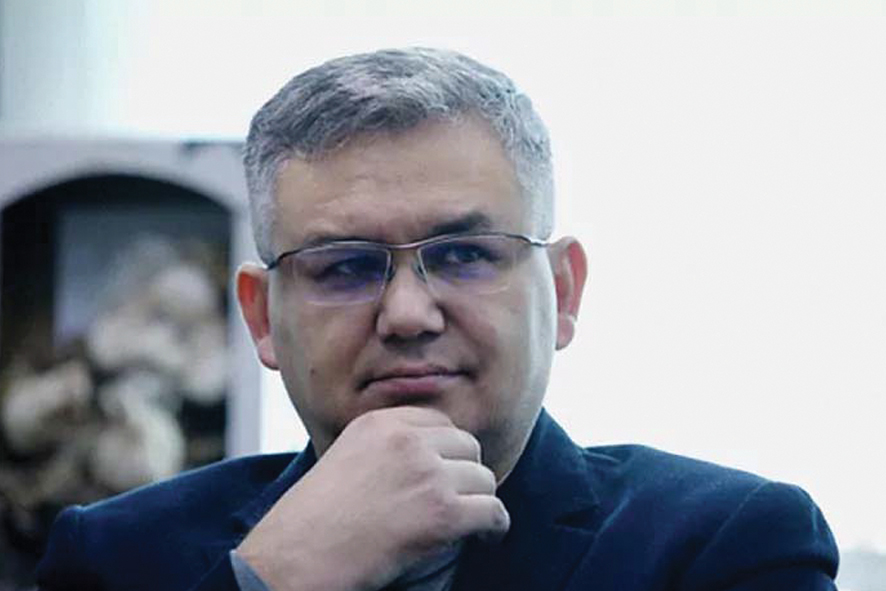
What about Prigozhin and Kadyrov? What are their designs?
Kadyrov, in his prime, wanted to be the chief, the leader of the Russian Muslim world, but now he’s not thinking about expansion. He’s got a lot of problems. The military defeats which the Russian army suffered in Ukraine, they hit Kadyrov hard. For many years, it was believed that these guys were the world champions, and now they’re beaten by guys from the neighborhood. And, of course, as with Putin, there were no other sources of legitimacy for Kadyrov beyond feeling that he’s strong, resolute and unbeatable – now everybody knows you can beat him. His main worry right now is keeping Chechnya under control.
If he doesn’t stop what he’s doing now, it will ultimately lead to a revolution. And the whole system will collapse
Prigozhyn is a marginal player. He couldn’t control his emotions; he was too ambitious, and he created too many conflicts, which became a problem for Putin as he started losing the loyalty of the army. Prigozhin’s activity is being curtailed, and he is under pressure. I wouldn’t say his game is over. No. If the Russian army fails again, Putin will have no-one to rely on except Prigozhin, and this might give him a second chance.
Prigozhyn won’t be able to become an independent player, so he is becoming a junior partner to Sechin and Patrushev’s team of Russian Siloviki, who are trying to work in favor of escalation of the conflict, and working in favor of introducing martial law and canceling the elections, just to try to hold on to this situation for as long as possible, without any strategy.
Where does the Russian opposition figure in all of this?
The Russian opposition is either in prison or abroad, so the only and best thing they can do is unite and start working on a candidate for the presidential election, and start campaigning. They need to show they are still alive, and should start working on the program of the future, to show people that there is somebody thinking about the future. Everybody is so preoccupied with tactics, with the current situation, that there is a total lack of a vision of the future in the country, and you cannot make a revolution unless you show people a bright future ahead.
Would the revolution involve Navalny?
Yes. He is now like a battery on charge. He’s in prison. He isn’t responsible for the current collapse, and people still remember him as Putin’s chief enemy. So when the regime collapses, it would be the natural reaction of people to turn in the direction of Navalny and ask what he thinks, what he has to say. He may well become a Russian Mandela.
Supposing Navalny’s Russia does materialize, what would its foreign policy look like?
It would be a normal, peaceful country, just like it was in the 90s. I am totally sure that all this Russian imperialism, all this Russian strategy based on conflicts with the Western world, has exhausted itself now. Everyone feels this has led us into serious trouble. It’s like post-war Germany, and this feeling is growing. In the end, when this feeling becomes overwhelming, the regime will collapse. Nobody will want a repeat of it. The demand for peace is growing. And it’s already, even according to official polling, now stronger than the demand for continuation of the war.
What would that mean for other conflicts in the post-Soviet region, for example, Transnistria and Georgia?
Russia wouldn’t like to intervene anymore. Sending soldiers abroad would become something like a taboo.
Interview by Vazha Tavberidze for RFE

